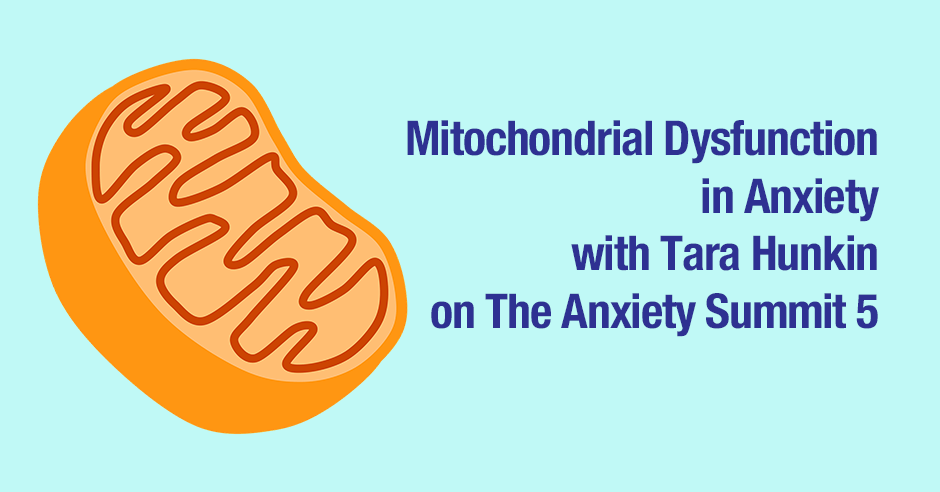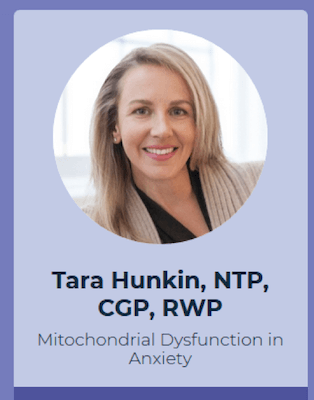Tara Hunkin, NTP, CGP, RWP is one my guest experts on The Anxiety Summit 5: Gut-Brain Axis and our topic is: Mitochondrial Dysfunction in Anxiety. In this interview you’ll learn:
- The role of mitochondria in the gut, brain and anxiety
- Causes (such as medications and environmental toxins), testing, and signs and symptoms of mitochondrial dysfunction
- Healing nutrients: Carnitine, COQ10, folinic acid, meal timing (as well as antioxidants and many other nutrients such as PQQ)
Tara starts with an overview of mitochondria, the energy powerhouses of our bodies and why they are so important in both physical and mental health.
You can hear some of this background information in this short in-person interview we did in San Diego recently.
You’ll also hear Tara share about this new bidirectional relationship that has been identified between anxiety and mitochondrial dysfunction. One of the papers she is referring to is this 2019 review paper: Anxiety and Brain Mitochondria: A Bidirectional Crosstalk. Here are the highlights:
- Despite the established link between mitochondrial dysfunction and various psychiatric disorders, the contribution of mitochondria in anxiety disorders has not been extensively addressed.
- Mitochondria are emerging as modulators of anxiety-related behavior, as evidenced both in animal and human studies.
- There is a bidirectional link between mitochondria and anxiety. Mitochondrial, energy metabolism, and oxidative stress alterations are observed in high anxiety; conversely, changes in mitochondrial function can lead to heightened anxiety.
Tara shares how important the mitochondria are when it comes to digestion and gut health too:
- the liver is heavily mitochondrial-dense and is needed to help eliminate toxins we are exposed to (toxins that affect our mitochondria and increase anxiety)
- the mitochondria are also important when it comes to digestion – the lining of digestive tract (the epithelial cells of the microvilli) contain large numbers of mitochondria
The authors also highlight that “Pharmacological manipulation of mitochondria may be a potential therapeutic approach to relieve high anxiety symptoms.” One of the objectives of this summit is to highlight non-pharmacological approaches and Tara does exactly this in our interview.
She covers both lifestyle and nutritional approaches for addressing mitochondrial dysfunction (acetyl-l-carnitine, glutathione, antioxidants, coenzyme Q10, folinic acid and many more).
I also mention two other interviews on the summit where we talk about nutrients that also support mitochondrial function: PQQ (pyrroloquinoline quinone) and TUDCA (tauroursodeoxycholic acid).
Be sure to listen to these interviews for more about these two nutrients:
- Jay Davidson, DC, PScD: Parasites, Anxiety and TUDCA for Your Liver
- Michael Murray, ND: PQQ for Stress, Sleep, Mitochondria and Gut Health
We also discuss testing and all the environmental factors that impact the mitochondria including medications such as risperidone/risperdal (and antipsychotic medication), valproic acid (used for seizures), fluoroquinolone antibiotics like Cipro (and others) and also benzodiazepines (the commonly prescribed anti-anxiety medications).
You can listen to each of the interviews (and get transcripts) by purchasing The Anxiety Summit 5: Gut-Brain Axis.
If you’d like to give feedback or ask a question, please post in the comments section. I’d love to hear from you once you’ve listened in.
If you’d like to give feedback or ask a question, please post in the comments section at the bottom.
I’d love to hear from you once you’ve listened in to this interview and the others.


